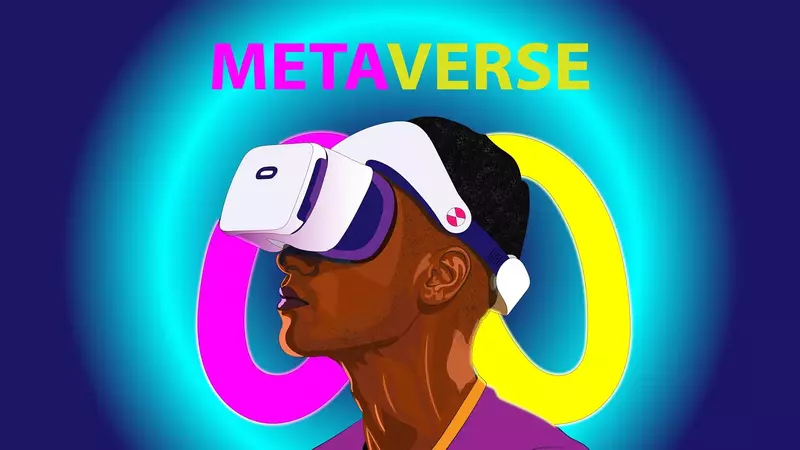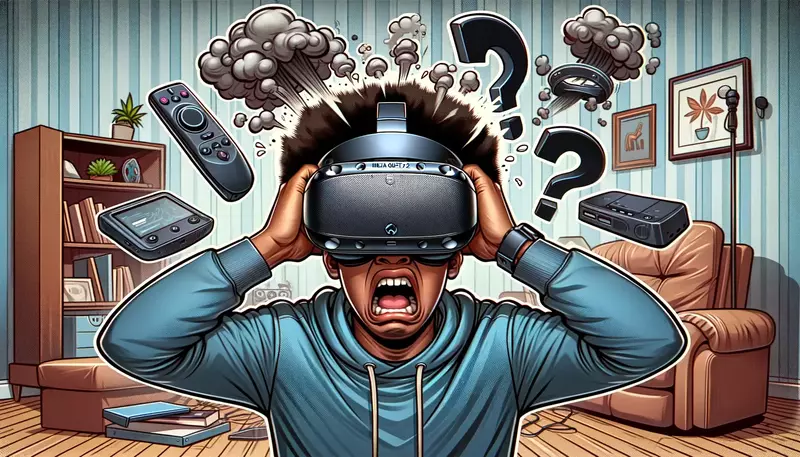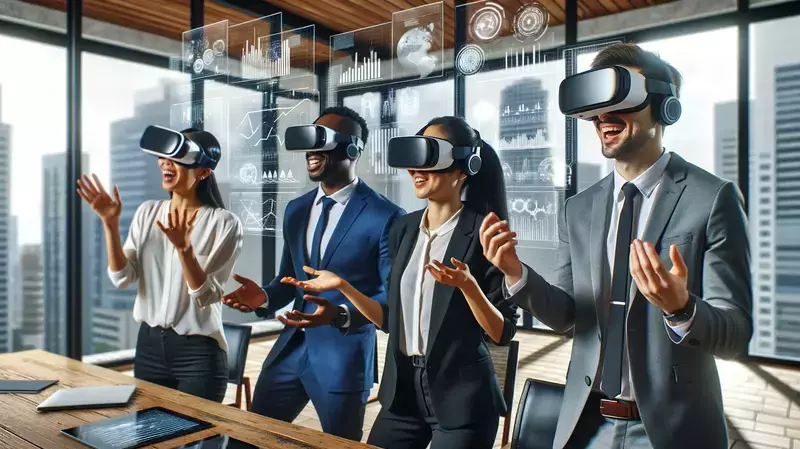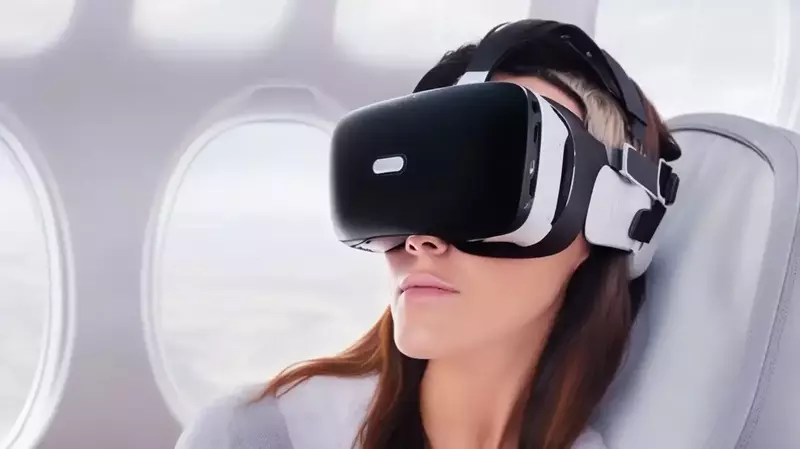This site contains affiliate links to products, and we may receive a commission for purchases made through these links.
What is the Facebook metaverse? This intriguing question has captured the attention of gamers, explorers, and those interested in virtual reality. As a concept that aims to revolutionize today’s online social experiences, the metaverse seeks to create an interconnected web of virtual worlds where users can interact with one another and find communities across various platforms.
In this blog post, we will delve into the vision behind Facebook’s ambitious project by examining how platforms like Oculus 2 VR system are laying the foundation for this digital universe. Furthermore, we’ll explore its expansion into business applications through partnerships with popular franchises.
We’ll also discuss the technologies powering these immersive environments such as Virtual Reality (VR) systems like Oculus Rift and Augmented Reality (AR) platforms that are expanding possibilities for interaction. Lastly, we will address ethical concerns and criticisms surrounding privacy issues and technology development challenges within this burgeoning realm known as “the metaverse.”

The Vision Behind Facebook’s Metaverse
The Facebook metaverse, now rebranded as Meta, aims to create an immersive digital world that transcends 2D screens and connects people through various activities such as gaming and virtual reality exploration.
CEO Mark Zuckerberg envisions this platform fostering communities, growing businesses, and enhancing user experiences. In this part, we’ll look at the basics of the metaverse and how it seeks to extend into various uses.
Platforms like Oculus 2 VR system laying the foundation for the Metaverse
One of the key components in building a successful metaverse is having powerful hardware capable of delivering immersive experiences. The Oculus Quest 2 VR system serves as one such example.
The Oculus Quest 2 VR system, with its untethered capabilities and affordability, has enabled Meta to make great strides towards realizing their vision of a connected digital universe.
By providing cutting-edge technology at an affordable price point, Meta has made significant strides toward making its vision of a connected digital universe more accessible.
Oculus Rift driving gaming opportunities in the metaverse
- Gaming: With popular titles like Beat Saber and Half-Life: Alyx available on platforms like Oculus Rift, gamers can enjoy high-quality content within these new realms.
- Social Interaction: Users can interact with friends or make new connections through multiplayer games or social apps designed specifically for VR environments.
- Educational Experiences: Virtual field trips and interactive lessons offer unique learning opportunities for students around the globe while immersing them in realistic settings they might not otherwise have access to.
Expansion into business applications with popular franchises
Beyond gaming, Meta is also exploring ways to bring the metaverse to businesses and enterprises.
By partnering with well-known franchises like Star Wars, they aim to create engaging virtual experiences that can be leveraged for marketing campaigns, employee training, or even customer support.
Examples of business applications in the metaverse:
- Virtual Showrooms: Retailers can showcase their products in a fully immersive environment, allowing customers to interact with items before making a purchase decision.
- Remote Collaboration: Companies can host meetings within virtual spaces where employees from different locations can collaborate on projects using 3D models and other interactive tools.
- Educational Workshops: Businesses could offer workshops or training sessions within VR environments that provide hands-on learning experiences for participants without needing physical space or equipment.
In this ever-evolving digital landscape, Meta’s vision of an interconnected universe holds great potential for both personal and professional use cases. As technology continues to advance at breakneck speeds, it will be fascinating to see how these innovations shape our understanding of what’s possible within the Facebook metaverse.
The dream behind Facebook’s Metaverse is to make a space that offers clients an all-encompassing involvement through computer generated reality and improved the truth tech.
By utilizing powerful technologies, the metaverse has the potential to revolutionize how people interact within business applications and popular franchises alike.
Meta’s vision for the Facebook metaverse is to create an immersive digital world that connects people through various activities such as gaming and virtual reality exploration. With platforms like Oculus 2 VR system laying the foundation, Meta aims to expand into different applications including business opportunities with popular franchises like Star Wars. The potential of this interconnected universe holds great promise for both personal and professional use cases in an ever-evolving digital landscape.
Technologies Powering the Metaverse
The Facebook metaverse, now known as Meta, is powered by a range of advanced technologies that enable users to immerse themselves in an interconnected digital universe.
AR and VR platforms, such as Spark AR and Oculus Rift, provide the tech for Meta’s virtual universe.
Virtual Reality Systems Driving Gaming Opportunities in the Metaverse
Oculus Rift, one of Meta’s flagship VR products, has been instrumental in shaping the gaming landscape within the metaverse. Oculus Rift’s cutting-edge visuals and intuitive controls enable gamers to enjoy their favorite titles in an immersive way.
The Oculus Store offers a vast selection of games specifically designed for VR play, providing endless opportunities for exploration and entertainment.
- Echo Arena: A zero-gravity multiplayer sports game where players compete against each other using various tactics and strategies.
- Lone Echo: An immersive single-player adventure set aboard a space station orbiting Saturn where players must solve puzzles to uncover mysteries surrounding their environment.
- Vader Immortal: A Star Wars-themed narrative-driven experience that places users into iconic moments from the franchise’s history.
Augmented Reality Platforms Expanding Possibilities for Interaction
Beyond virtual reality experiences lies another key technology driving Meta’s vision: augmented reality. Spark AR is one of the largest AR platforms available today, enabling developers to create engaging interactive content accessible through smartphones or smart glasses like those developed through Meta’s collaboration with Ray-Ban.
AR enables a combination of physical and digital environments, allowing users to merge virtual elements with the real world.
Some notable examples of AR experiences powered by Spark AR include:
- Instagram Filters: Users can enhance their photos and videos with interactive filters that respond to facial movements or environmental changes.
- Pokemon Go: A popular mobile game where players capture virtual creatures called Pokemon overlaid on real-world locations using their smartphone’s camera.
- Nike Fit: An app that uses AR technology to help customers find the perfect shoe size by virtually measuring their feet within the app interface.
The combination of VR and AR technologies is propelling Meta’s metaverse vision forward, creating new opportunities for gaming, exploration, and social interaction.
As these technologies continue to evolve, so too will the immersive experiences they enable within this expansive digital universe.
The emergence of virtual and augmented reality systems has spurred a dramatic increase in the metaverse, providing gamers with enthralling experiences that were formerly inconceivable.
Also, as these technologies continue to evolve, it is important to consider potential ethical implications as well as criticisms tied to technology development challenges which will be discussed further in the next heading.
Meta, formerly known as the Facebook metaverse, is a digital realm driven by advanced tech such as Virtual Reality (VR) and Augmented Reality (AR), enabling users to submerge themselves in this alternate universe. Oculus Rift, one of Meta’s flagship VR products, has been instrumental in shaping the gaming landscape within the metaverse while Spark AR enables developers to create engaging interactive content accessible through smartphones or smart glasses like those developed through Meta’s collaboration with Ray-Ban. The combination of VR and AR technologies is propelling Meta’s vision forward, creating new opportunities for gaming, exploration and social interaction.
Addressing Ethical Concerns and Criticisms
Ethical concerns and criticisms have arisen in the development of the Facebook metaverse, now known as Meta.
As part of its responsibility framework for ensuring ethical use cases around these technologies, CEO Mark Zuckerberg emphasizes key points, including user privacy concerns and potential misuse scenarios that may arise.
This can arise due to widespread adoption across various sectors, including entertainment and communication industries alike.
Privacy Concerns Surrounding Large-Scale Immersive Platforms
The vast amount of data collected by immersive platforms like Meta raises significant privacy concerns.
With users spending more time in virtual environments, their actions, preferences, and interactions can be tracked extensively. This information could potentially be used for targeted advertising or even surveillance purposes.
To address these issues, Meta has introduced a set of privacy principles aimed at giving users control over their personal information while maintaining transparency about how it is being used.
- Data minimization: Collect only what is necessary to provide services within the metaverse.
- User control: Empower users with choices regarding their data usage.
- Transparency: Clearly communicate how user data is collected, processed, stored & shared.
- Security: Implement robust security measures to protect user data from unauthorized access or misuse.
- Fairness & non-discrimination: Ensure equal treatment regardless of race, gender identity or other factors when using AI systems in decision-making processes related to user experiences within the metaverse environment.
Potential Criticisms Tied to Technology Development Challenges
As Meta continues to develop its metaverse platform, critics argue that big tech’s reach could expand even further with more layers of user data being accessed within this virtual realm.
Worries exist regarding the possibility of monopolistic behaviour, limited rivalry in the area, and matters linked to content control and censorship.
Experts contend that an open-source strategy would be preferable for encouraging invention and guaranteeing fairness between creators. The Open Metaverse Initiative is one such effort aimed at creating a decentralized ecosystem where multiple companies can contribute towards building interoperable technologies while maintaining transparency and accountability.
In response to these criticisms, Meta has committed itself to working collaboratively with other industry players, regulators, and policymakers in order to create a safe and inclusive environment for all users.
By addressing ethical concerns head-on and prioritizing privacy principles from the outset, Meta aims to build trust among its user base while laying the foundation for an immersive digital world that transcends traditional boundaries.
Meta, formerly known as Facebook metaverse, has faced ethical concerns and criticisms regarding user privacy and potential misuse scenarios. Meta has sought to tackle worries about user privacy and misuse scenarios by devising a range of principles that give users authority over their personal data while remaining open about how it is utilized. Critics argue that big tech’s reach could expand even further with more layers of user data being accessed within this virtual realm, but Meta aims to build trust among its user base by prioritizing privacy principles from the outset.
What is the Facebook Metaverse?
The Facebook Metaverse, as described by Mark Zuckerberg, is a shared virtual space where users can interact with each other and digital objects through avatars.
It combines elements of social media, gaming, and augmented reality (AR) to create an immersive experience for users.
The Oculus platform plays a significant role in Facebook’s vision for the metaverse.
Benefits of the Facebook Metaverse
The integration of the metaverse into Facebook offers several benefits, including enhanced user engagement through immersive experiences and new revenue streams from virtual goods and services.
It also increased collaboration opportunities within professional environments like Workrooms, and potential growth in advertising due to highly personalized content based on user behavior within this virtual environment.
Why Did Mark Zuckerberg Start the Metaverse?

Zuckerberg started exploring the concept of a metaverse as part of his ambition to advance technology beyond traditional screen-based interactions.
He believes that creating an interconnected digital world will lead to more meaningful connections between people while also providing new avenues for entertainment, commerce, and education.
Acquiring Oculus VR was one step towards achieving this goal.
The Point of the Metaverse
The main purpose behind developing a comprehensive metaverse lies in offering users unique ways to connect with others digitally while expanding their access to various forms of entertainment or educational resources.
Additionally, it provides businesses with innovative methods for reaching customers through interactive marketing campaigns or collaborative workspaces.
!! For more information about the different VR headsets on the market, check out this product specification list.
Final Thoughts
Facebook’s metaverse is a vision of a virtual world where people can interact, play games, and conduct business. Oculus 2 VR and other tech are forming the base for a completely immersive experience that could go beyond gaming into areas such as education, healthcare, and socializing.
However, there are also ethical concerns surrounding privacy issues with large-scale immersive platforms. Critics have raised questions about technology development challenges that may arise in creating an all-encompassing virtual reality space.
If you want to learn more about the potential of the Facebook metaverse or explore how it could benefit your business or organization, visit Pursuit Meta. Our team specializes in helping clients navigate emerging technologies like AR/VR to create innovative solutions that drive results.

Espen
Espen is the Director of PursuitMeta and has written extensively about Virtual Reality and VR Headsets for years. He is a consumer product expert and has personally tested VR Headsets for the last decade.





Leave a Reply